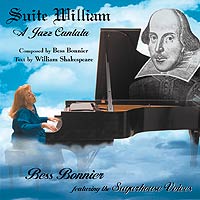 |

|
|
Full Review --SUITE WILLIAM |
 |
| SEMJA Update, August 1999 |
 |
 |
(Southeastern Michigan Jazz Association)
Recent Recordings By Area Musicians
By Piotr Michalowski
|
 Bess
Bonnier is known primarily for her excellent modern jazz piano playing
and for her occasional vocals. Her new CD demonstrates that she is also
an accomplished composer. Bess
Bonnier is known primarily for her excellent modern jazz piano playing
and for her occasional vocals. Her new CD demonstrates that she is also
an accomplished composer.
|
On Suite William: A Jazz Cantata
(Noteworks Records 104) she offers
thirteen compositions written to the words of William Shakespeare. In keeping
with the quality of the lyrics, she has chosen to surround herself with
a first-rate group of musicians: Paul Finkbeiner (trumpet), George Benson
(tenor and soprano sax), Russ Miller (flute), Cary Kocher (vibes, congas),
Paul Keller (bass), and Peter Siers (drums). I must admit that I had my
suspicions about this project, but the music won me over very quickly.
Miss Bonnier avoids the obvious, does not offer overdone pathos, and seems
to treat the Bard with a mixture of respect, affection, and irreverence,
with a dollop of humor. One play fragment gets a calypso treatment, another
is done in Horace Silver style, while a third one is set to waltz time.
The Sugarhouse Voices blend well, and excel on an a cappella version of
"How Sweet the Moonlight" (from Merchant of Venice). The focus here is
on words and melodies, but much of the success of the CD is due to the
splendid solos of Finkbeiner, Benson, Miller and Kocher. The music was
written to work as a suite, but there is one tune here that should become
a classic: Bonnier's musical setting of Sonnet XVIII, "Shall I Compare
You to A Summer's Day." The track begins with the composer alone at the
piano, soon joined by singer Judie Cochill, whose simple direct delivery
is just right. Eventually Keller's bass joins the two. Benson on tenor
sax and Bonnier offer apposite solos, and all three musicians accompany
Cochill on a reprise of the last verse. There is an effortless beauty to
all of this that can only come from musicians of this stature. The melody
is deceptively simple: the first few notes seem taken from Tadd Dameron's
"If You Could See Me Now," but this turns out only to be a vague inspiration
and the harmony and the musical line follow into another direction. The
words and music fit so well it is difficult to imagine that they have been
separated by the same language and hundreds of years.
Reprinted from SEMJA Update
|
|
|
 |
|





